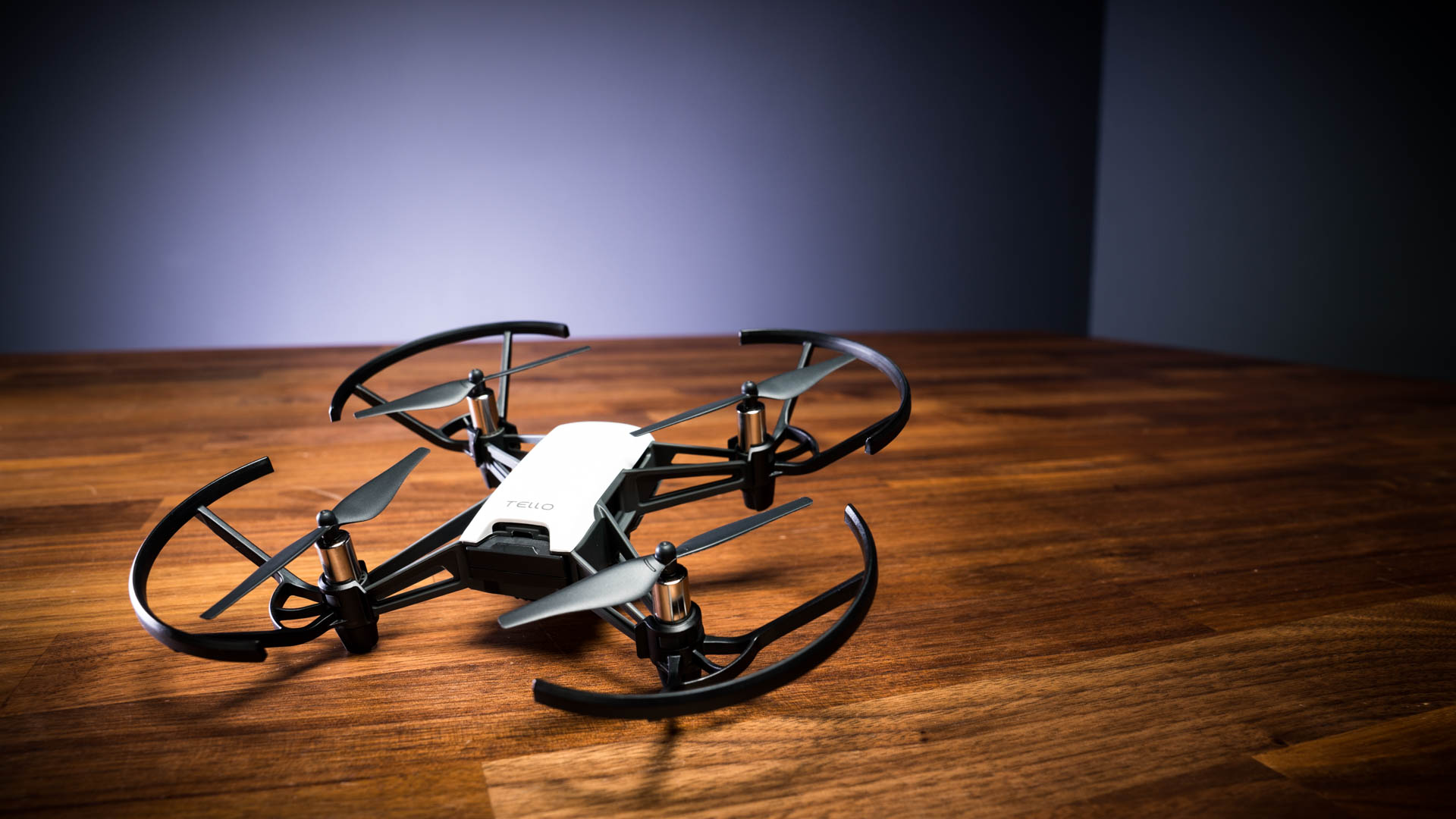
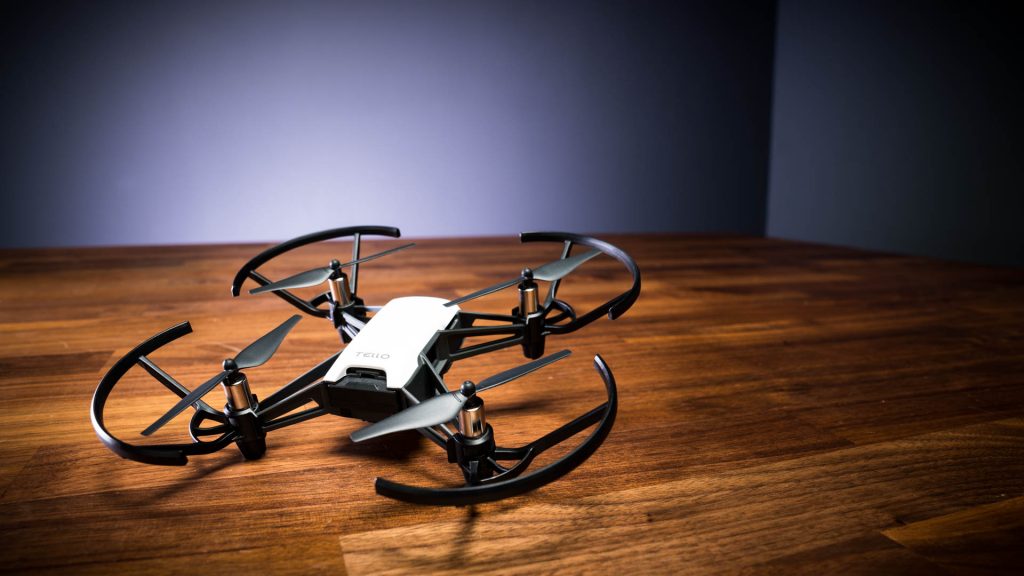
Small drones are trending, but at what point are you paying for less features over better functionality? Lower cost is great, but paying a premium for minimal flight time or a shoddy connection doesn’t improve the drone piloting experience. The Ryze Tello bucks the trend of sub-$100 drones pushing weak performance and includes pretty advanced features for a microdrone, including a partnership with DJI.
For beginner drone enthusiasts from kids to adults, getting a hold of an inexpensive toy that still has exciting features is what can hook a future pilot and get them really into the hobby in an approachable way. With some interesting features in a pint-sized package, the Tello may just be the year’s best beginner drone.
How to Choose a Beginner Drone
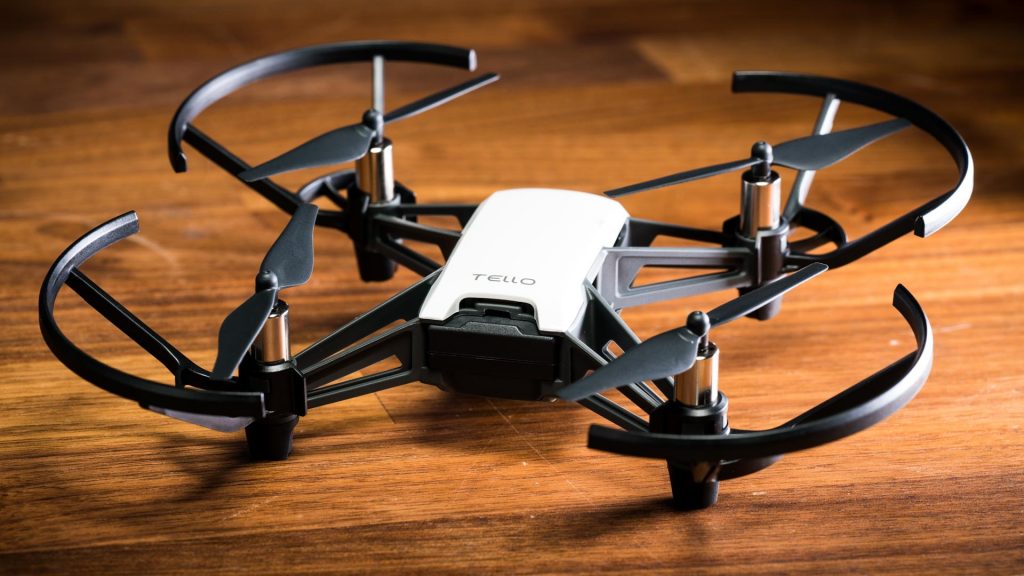
First off, there is a bit of a subjective bias that can present itself when discussing what is classified as a “beginner drone”. A beginner photography drone for adults for example can definitely have more advanced features than a general “beginner drones” for kids, but I have a few personal qualifications that I’m using to define this type of device.
A beginner drone should first and foremost be economical. That itself might mean different things to different people, but for me that is under $100. A low-level photography drone (as mentioned earlier) may be something like a $200 quadcopter with a modest camera and mechanical gimbal, definitely the low end of a true photography drone spectrum— but not economical for a complete newbie to the hobby.
Will the new pilot even like the hobby? It is best to take things slow, with low investment until a real interest is developed. Also, when thinking of something a kid might play with, $200 is far above my comfort level to put a youngster in charge of.
Secondly, a beginner drone needs to account for the danger associated with aerial remote control objects and unskilled pilots. I prefer to lean to the small-form for beginner drones, since an object under a half-pound falling from the sky does a lot less damage than something weighing a few pounds.
Ryze Tello – The Beginner Drone with Some Interesting Features

One could be forgiven for not expecting to see much in the features list with most beginner drones, since small-form and low cost typically don’t lend much room for extra features. Surprisingly enough though, Ryze managed to squeeze some features on that piqued my interest.
- 13 min flight time
- 720p camera @30fps
- 8D flips
- Weight 87g
- 17.8mph
- 100m transmission distance
- 2.4GHz
- 1100 mAh LiPo battery
- VR smartphone headset compatible
- Digital image stabilization
- 5MP still images
- Tello SDK programming
- Scratch programming
STEM & Drones
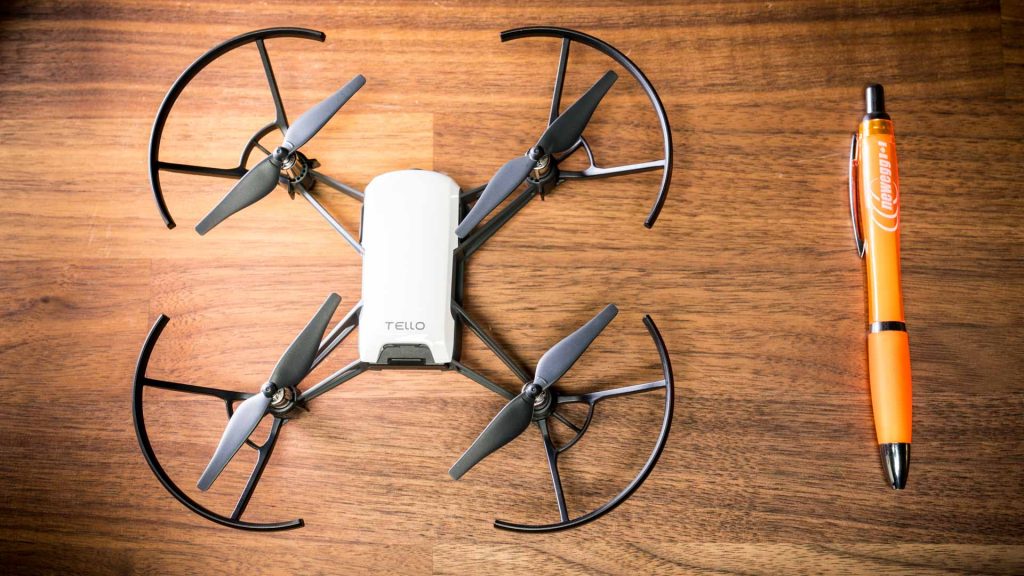
There are a few drones out there with STEM (Science, Technology, Engineering, Math) elements involved (like the Airblock), and it is a great way to make coding both fun and tangible for kids. This is where the Tello shines as a great beginner drone for kids, where they can use Scratch coding to execute drag and drop block-based visual programming.
Scratch has become popular with many STEM toys due to the way that it simplifies the process, and gives kids an easy way to visualize the concepts that lay the foundation for more advanced programming languages. This translates into a highly valued skill set, and just like any language, learning the basics at a younger age provides a leg up in real life application.
The Tello can also scale upwards as kids grow, with a SDK (Software Development Kit) for the more advanced programmers.
DJI Drone Smarts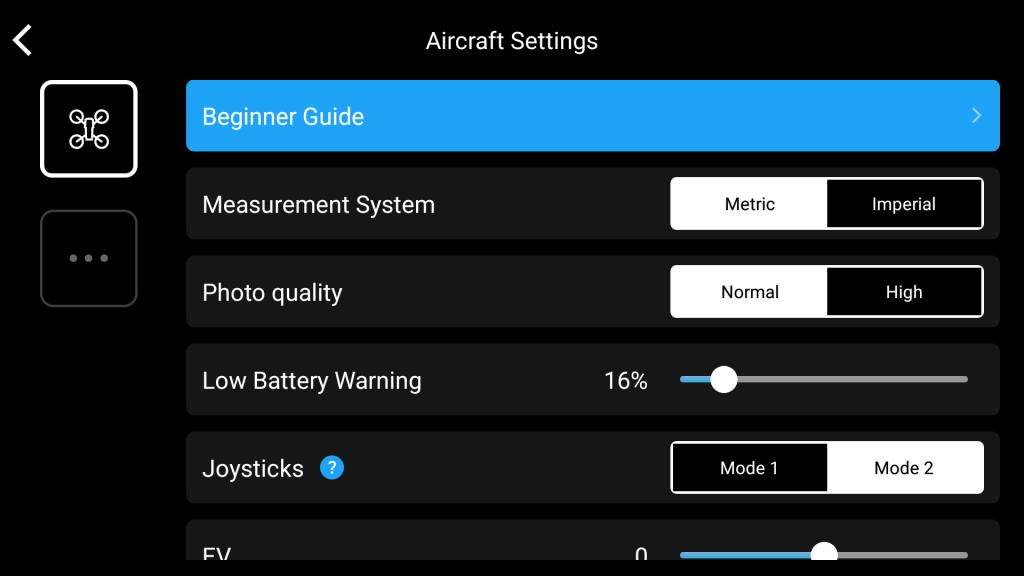
The Tello is manufactured by Ryze, through a partnership with DJI which includes the flight tech and interface the drone giant has come to be defined by. Considering the price point of under $100, having the flight systems (even if they are a fraction of what you get with a full-DJI drone) from that brand is unheard of.
With DJI putting their name on this mini quad, it definitely legitimizes the Tello in a way that most other beginner drones could only dream of. Beyond the software juice the Tello comes laced with, they carry the clout of an Intel 14-core processor to power all those fancy DJI functions, and keep things running smoothly.
A $99 drone has DJI flight tech and interface, with an Intel 14-core processor. Let that marinate for a minute. Then sprinkle on the dual downward-facing infrared sensors, one downward-facing vision sensor, serve with a side of a safe landing failsafe in the event of connectivity or battery loss, and you have the perfect recipe for the best beginner drone with some actual smarts to it.
Tello in Flight
One of DJI’s hallmark qualities is their pilot interface and pre-programmed flight modes, some of which have made their way into the Tello.
Throw & Go
Toss the drone into the air and the Tello will hover in place, so you can start flying without taking off from the ground. This is definitely not so much a useful mode, but more a fun trick to play with, and it is fun to throw the drone.
8D Flips
This is actually a really cool mode, which allows the pilot to flip the drone in eight different directions while in-flight. When this mode is engaged, a box appears in the app on the phone screen which uses touch to flip forward, backwards, diagonally, or roll sideways.
The flips were clean, and although the response of “finger slide” command on-screen occasionally wouldn’t register at first the function was super fun. The ability to do this on a non-racing drone is pretty slick, since doing this manually would be quite difficult.
Bounce Mode
The quadcopter will automatically fly up and down within 0.5 and 1.2 meters from a hand or other flat surface underneath the unit automatically, in a bouncing motion. This kind of reminds me of a Yoyo-type move or “trick” I suppose one could say.
Aside from the flight modes, the regular piloting was quite smooth. The auto takeoff and landing works just like any DJI drone, with a simple slide to launch and tap to set down, if not doing a manual landing.
The transmission distance is reported from Ryze at 100m, which I would assume is in clear open country. Since this drone is smaller and the potential for damage far less than with other drones, a likely scenario is flying in the backyard or a park without necessarily tons of space. In a business park with plenty of interference I was able to get a little less than this distance without issue, however the Wi-Fi signal was sketchy due to the buildings and cars around, so either a closer distance or open spaces are best for complete control.
The interface feels very familiar, from the way things are laid out to the icons it has the DJI feel all over it.
I should say that I’m not at all a fan of mobile joysticks for controlling drones since they don’t offer the same level of precision or the feedback as a physical transmitter, but for $99 and the interface you get I’m alright with the Tello going this route. Even considering the Tello travels a max speed of 17mph (which is no slouch), instant directional change is not a do-or-die like it would be with a higher performance drone.
If pilots really want to get a physical transmitter for this quad, they can opt for a $99 one but at the same cost as the drone itself I’d say it isn’t worth it.
The handling of the drone is very good, from the even-keel hovering in-place to the responsiveness of the controls (in their digital form) this is a stable unit that doesn’t feel squirrely at all like other cheap drones.
There is some slight lateral drift during hovering, but even more solid than some of the full-sized photography drones that I have flown, so I’m pretty impressed. Even in a slight breeze this little thing doesn’t get tossed as easily as I would have expected, and manages to hold position pretty well.
Can a sub-$100 drone camera perform?
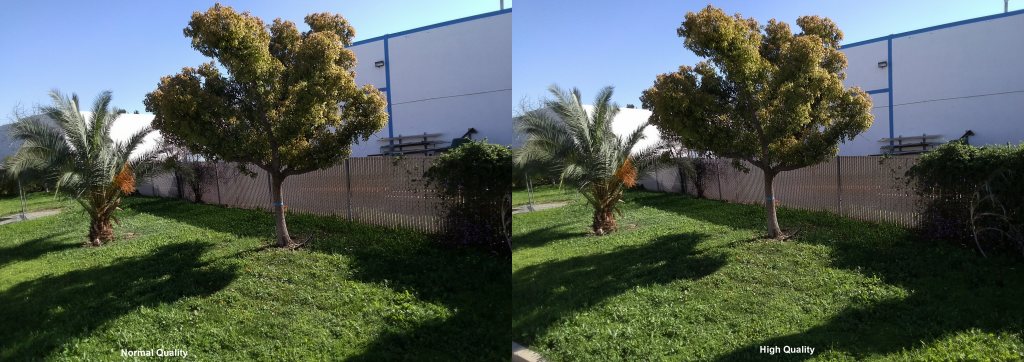
In all honesty, I don’t expect too much from a microdrone camera, and especially one under a hundred dollars. With the Tello pilots can adjust photo quality settings from the generic “Normal” to “High” as well as Exposure Value, which isn’t the most detailed suite of options but this isn’t a drone used to produce the next cinematic masterpiece so it is fine.
The digital image stabilization works reasonably well, and while the image doesn’t jump around nearly as bad in the “Slow” speed setting there is some jiggling that occurs during movement.
The high-speed performance definitely becomes choppier, and the video feed tended to skip ahead every couple seconds. This seemed to happen on a few occasions, and sharp turns with a high-speed rate pitched the camera wildly.
The photo quality at 5MP isn’t close to the quality of the photography drones beginners would be stepping up to after, but the ability to take pictures with some pre-programmed functions, interact with the live view and capture video is certainly on par with a great dip into the world of real quadcopter piloting.
Naturally, with a $99 price tag you won’t be getting the DJI mechanical gimbal, high-definition camera, or the full gambit of controls but there are some familiar DJI camera functions that make it onto the Tello.
EZ Shots
- Circle: This mode causes the drone to fly in a circle from the point of origin, while recording a video.
- 360: In 360 mode, the quadcopter spins in place for a 360° circle, capturing a video during the process.
- Up & Out: This mode is similar to the “Dronie” mode on the Mavic Air, in the sense that it flies upwards and backwards from the point of origin while recording a video. Of course on the Tello the camera doesn’t have the ability to lock onto the subject, but a similar function nonetheless.
Is the Ryze Tello the Best Beginner Drone of 2018?
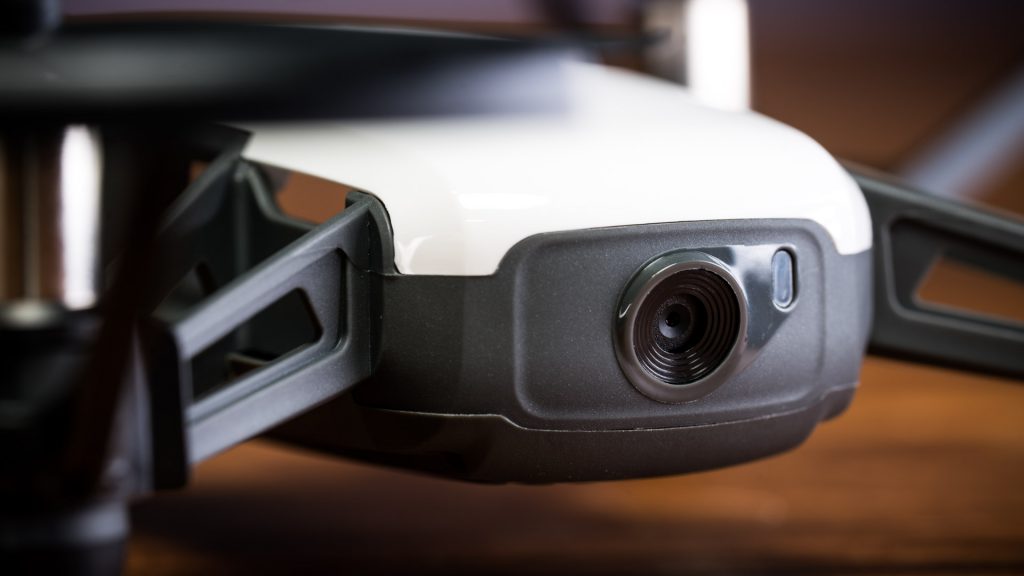
As far as I’m concerned, “beginner drone” doesn’t need to mean “toy”. For kids, a cheap drone that can safely be operated without as big of a risk of danger is a good start to the hobby, but there is really much more to it than that.
The Tello takes a toy price and slaps it on some actual functions that are similar to what we’re seeing in the photography drone market. The stability and interface for the price alone would be enough for me to say this is the best beginner drone I’ve seen in 2018, to really bridge the gap between a first experience in the drone world and further exploration of the hobby.
Are there cheaper beginner drones out there? Sure, there are simple throwaway toys for $20 that kids can fly for a little while before they peter out. But that doesn’t do much to get them (or adults for that matter) really into the hobby. Those quadcopters are cheap quality, simple RC toys that share virtually no characteristics with more advanced models that would really serve as the next step.
For anyone looking to get into the hobby but want to test the waters before diving in headfirst, the Ryze Tello is the best beginner drone for kids that want to have fun and really learn the basics of not only piloting drones, but also programming to boot. Heck, the Tello is really the best beginner drone for adults who aren’t sure if they want to sink a few hundred bucks into something that may get used once or twice before finding it stuck on a shelf.

